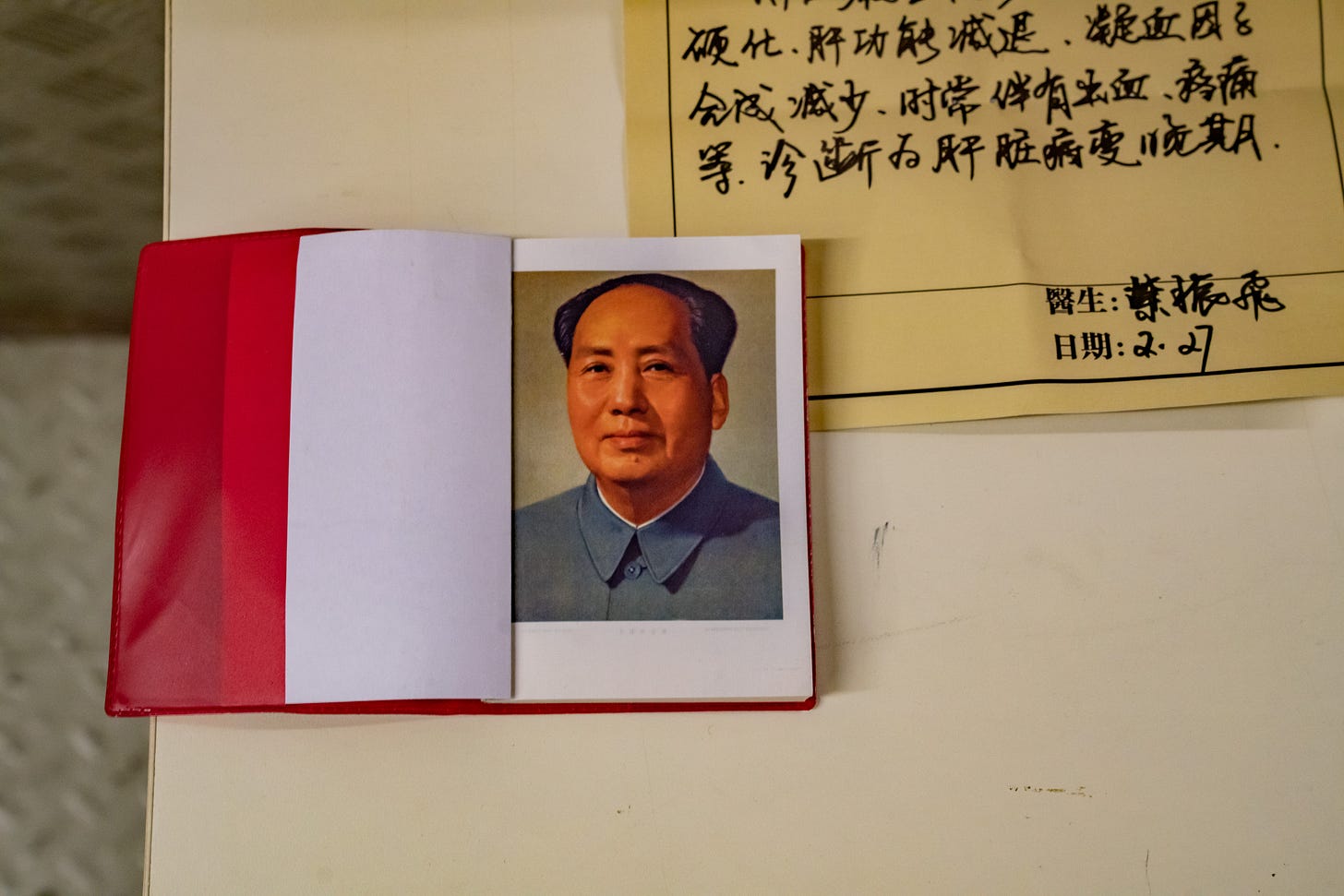Chairman Trump's Great Grift Forward
Move over, Mao.
PN is supported by paid subscribers. Become one 👇
Millions of Americans voted for Donald Trump multiple times because they thought that because of his experience in business, he must understand the American economy — and know how to make it work.
In reality, however, whatever success Trump had in his career was built on insight not into the workings of capitalism but into the darker corners of human nature. He succeeded through scams, lies, and bullying, using the power he had over others to enrich himself at their expense.
So no one should be surprised that he brings the same spirit to policymaking. In his second term, Trump is at last unleashed to fully realize his vision, and on economics, that means a new kind of mobster state capitalism.
Case in point: When Trump looked at the chip maker Intel, he saw a vulnerable company to which he could put the screws. So after getting the ball rolling by publicly attacking its CEO, Lip-Bu Tan, and demanding he resign, Trump made his demand and got what he wanted: The federal government will purchase a 10 percent stake in the company for $20 a share, about $5 less than the current value.
The president wants everyone to know this “deal” was a product of intimidation.
“He walked in wanting to keep his job and he ended up giving us $10 billion for the United States. So we picked up $10 billion,” Trump said last Friday.
And what exactly did America get? Other than leverage over a troubled corporation by becoming a major shareholder, it’s hard to say; a bump in Intel’s share price won’t exactly make the government enough to pay down the debt. Is the man who gave the world Trump University going to be advising Intel on how to turn its fortunes around, leading to a boost for the whole economy? It’s hard to imagine.
This is only the latest in a series of moves Trump has made to give himself control over specific companies, most of which involve him spotting a firm that’s in a difficult position — or putting it there — then demanding some kind of tribute.
Trump approved the sale of US Steel to a Japanese company, but only on the condition that the government receive a “golden share” that gives him the ability to dictate the firm’s future. In exchange for granting export licenses to sell chips to China, he demanded 15 percent of the sales Nvidia and AMD make there.
These high-profile shakedowns are just the beginning. Trump has taken to regularly attacking particular corporate leaders who displease him. He ordered Walmart to “EAT THE TARIFFS” rather than raise prices, which would reflect poorly on him. He told Goldman Sachs to get a new chief economist after it predicted that tariffs would raise prices. His bizarre obsession with the supposed evils of windmills has expanded into an assault on renewable energy unlike anything we have seen before from even the most conservative Republican administrations; according to one estimate, his policies have led to the cancellation of $19 billion in clean energy projects this year.
Exemptions from his capricious tariffs are given to favored industries or companies. He even claims (falsely) that pledges by foreign countries to invest in the US in coming years are personal payoffs to him that he will control.
“They gave me $600 billion, and that’s a gift,” he said about one such pledge from European countries. “They gave us $600 billion that we can invest in anything we want.” (Spoiler alert: not remotely true!)
Trump’s version of mobster state capitalism also means pressuring companies into reflecting his values and those of his MAGA movement. While he has no legal authority to force companies to shutter their DEI offices and make sure they never again speak a positive word about diversity, he and his administration have simply acted as though he does, issuing statements demanding that companies comply with executive orders that have no force of law, especially over the private sector.
For instance, Federal Communications Commission chair Brendan Carr — whose devotion to Trump is so idolatrous he wears a gold bust of the president on his lapel — sent letters to companies the FCC regulates demanding that they end their perfectly legal DEI policies. Verizon did so — and just hours later, got its purchase of Frontier Communications approved by the FCC.
That may have been less floridly corrupt than the shakedown of Paramount, which consented to a $16 million payoff to Trump’s future “library” (which we can assume will be nothing but a slush fund for him to use after he leaves office) in the hopes of securing approval for its merger with Skydance. But the result in the two cases is the same: Mergers will be approved not on the basis of antitrust law or what might be good for consumers or the economy, but on which companies have displeased or mollified Trump.
The White House has even gone so far as to create a loyalty rating system scoring over 500 companies on their “support of present and future administration initiatives.” According to one report, “In addition to considering companies’ support of Trump’s agenda, the scorecards also take into account companies’ social media posts, press releases, video testimonials, advertisements and attendance at White House events.” Any corporation looking to avoid Trump’s wrath doesn’t want to be on his naughty list.
What distinguishes Trump’s version of state capitalism from what you might find in other places is its random character, with every decision driven by the whims of one erratic man. This isn’t like the Chinese government deciding to subsidize the production of solar panels to make the country the world’s biggest supplier — even if you don’t like the idea of a government exercising that much economic control, at least one can understand the objective and the methods used to achieve it.
The party of “free enterprise” is oddly silent
Joe Biden had an industrial policy too, one based on increasing manufacturing and reviving troubled areas that had experienced job loss and displacement. Its success may have been limited, but at least it had a purpose that was hard to argue with.
On Monday, a reporter asking about Intel noted to Trump that while he called Kamala Harris a “communist,” the Biden-Harris administration never nationalized any corporations. So is government seizing this much control over particular companies the new way of doing industrial policy?
“Yeah, sure it is. I want to try and get as much as I can,” Trump responded. “I hope I have many more cases like it.”
With just a few exceptions, Trump’s party of small-government, private-enterprise conservatives is strangely unconcerned, at least in public.
Sen. Tom Tillis of North Carolina said, “You’re going to have to explain to me how this reconciles with true conservatism, with true free-market capitalism. I don’t see it” — but Tillis is retiring. Others are left to perform logical somersaults in an attempt to reconcile Trump’s policies with the ideology they supposedly believe in.
How many thousands of times have we been told by conservatives that the market should be left to operate without the heavy hand of government mucking about in it? Regulation to protect consumers and workers, a robust social safety net, attempts to compensate for market failures — all are attacked as affronts to the market’s purity and wisdom. And creating a version of capitalism unencumbered by government meddling was supposed to be good as both a moral and practical matter. Not only would it allow individuals to live and act with maximal liberty, it would produce the best economic outcomes, enabling the economy to flourish and create wealth from which all would benefit.
But if nearly the entire Republican Party has no objection to Trump shoving his fingers so deeply into individual corporate decision-making, then they don’t actually believe in “free enterprise.”
For many years, Republicans fancied themselves the party of ideas. Unlike the Democrats with their grubby coalitional politics, trading favors and distributing spoils, they claimed to believe in things — foundational principles guiding ideas about what government does and how society should work. But Trump revealed them for who they truly are.
Perhaps the most important thing to understand about Trump’s mobster state capitalism is that it isn’t about economic efficiency or stimulating growth, let alone a vision of how the economy works and what it should create. It’s about power, pure and simple. Trump is expanding his own personal power in every direction he can — over Congress, over universities, over civil society, and over American business. One manufacturing CEO compared Trump’s attention to the Eye of Sauron — business leaders just hope it doesn’t fall on them and they find themselves subjected to a shakedown, or punished in some other way.
You can understand why they’d want to keep their heads down. But this is no way to run an economy. And everybody — including both the socialists and the capitalists — knows it.
That’s it for today
We’ll be back with more tomorrow. If you appreciate this edition, please do your part to keep Public Notice free by signing up for a paid subscription.
Thanks for reading.






So we now have a new title for Trump: Extortionist-in-Chief.
Thank you, Mr. Waldman.